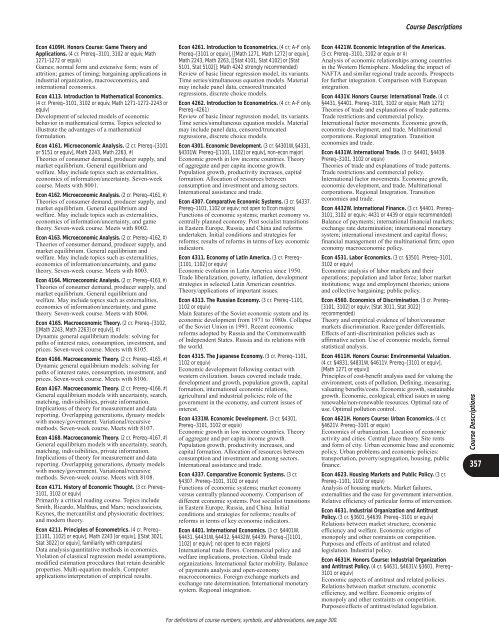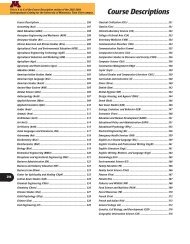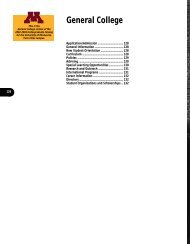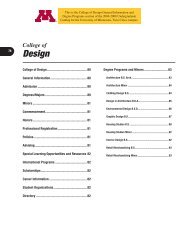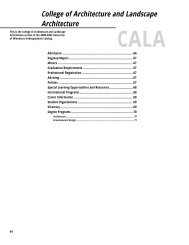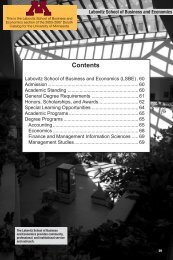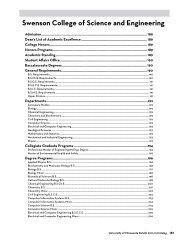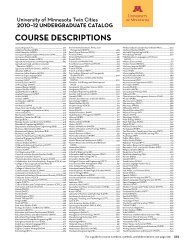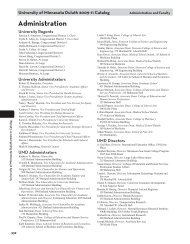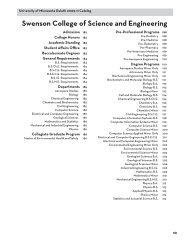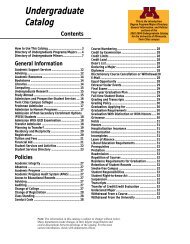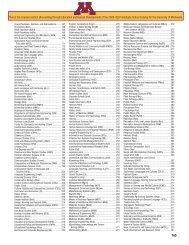CoursesâCSCI through FSCN - University Catalogs - University of ...
CoursesâCSCI through FSCN - University Catalogs - University of ...
CoursesâCSCI through FSCN - University Catalogs - University of ...
You also want an ePaper? Increase the reach of your titles
YUMPU automatically turns print PDFs into web optimized ePapers that Google loves.
Course DescriptionsEcon 4109H. Honors Course: Game Theory andApplications. (4 cr. Prereq–3101, 3102 or equiv, Math1271-1272 or equiv)Games; normal form and extensive form; wars <strong>of</strong>attrition; games <strong>of</strong> timing; bargaining applications inindustrial organization, macroeconomics, andinternational economics.Econ 4113. Introduction to Mathematical Economics.(4 cr. Prereq–3101, 3102 or equiv, Math 1271-1272-2243 orequiv)Development <strong>of</strong> selected models <strong>of</strong> economicbehavior in mathematical terms. Topics selected toillustrate the advantages <strong>of</strong> a mathematicalformulation.Econ 4161. Microeconomic Analysis. (2 cr. Prereq–[3101or 5151 or equiv], Math 2243, Math 2263, #)Theories <strong>of</strong> consumer demand, producer supply, andmarket equilibrium. General equilibrium andwelfare. May include topics such as externalities,economics <strong>of</strong> information/uncertainty. Seven-weekcourse. Meets with 8001.Econ 4162. Microeconomic Analysis. (2 cr. Prereq–4161, #)Theories <strong>of</strong> consumer demand, producer supply, andmarket equilibrium. General equilibrium andwelfare. May include topics such as externalities,economics <strong>of</strong> information/uncertainty, and gametheory. Seven-week course. Meets with 8002.Econ 4163. Microeconomic Analysis. (2 cr. Prereq–4162, #)Theories <strong>of</strong> consumer demand, producer supply, andmarket equilibrium. General equilibrium andwelfare. May include topics such as externalities,economics <strong>of</strong> information/uncertainty, and gametheory. Seven-week course. Meets with 8003.Econ 4164. Microeconomic Analysis. (2 cr. Prereq–4163, #)Theories <strong>of</strong> consumer demand, producer supply, andmarket equilibrium. General equilibrium andwelfare. May include topics such as externalities,economics <strong>of</strong> information/uncertainty, and gametheory. Seven-week course. Meets with 8004.Econ 4165. Macroeconomic Theory. (2 cr. Prereq–[3102,[[Math 2243, Math 2263] or equiv]], #)Dynamic general equilibrium models: solving forpaths <strong>of</strong> interest rates, consumption, investment, andprices. Seven-week course. Meets with 8105.Econ 4166. Macroeconomic Theory. (2 cr. Prereq–4165, #)Dynamic general equilibrium models: solving forpaths <strong>of</strong> interest rates, consumption, investment, andprices. Seven-week course. Meets with 8106.Econ 4167. Macroeconomic Theory. (2 cr. Prereq–4166, #)General equilibrium models with uncertainty, search,matching, indivisibilities, private information.Implications <strong>of</strong> theory for measurement and datareporting. Overlapping generations, dynasty modelswith money/government. Variational/recursivemethods. Seven-week course. Meets with 8107.Econ 4168. Macroeconomic Theory. (2 cr. Prereq–4167, #)General equilibrium models with uncertainty, search,matching, indivisibilities, private information.Implications <strong>of</strong> theory for measurement and datareporting. Overlapping generations, dynasty modelswith money/government. Variational/recursivemethods. Seven-week course. Meets with 8108.Econ 4171. History <strong>of</strong> Economic Thought. (3 cr. Prereq–3101, 3102 or equiv)Primarily a critical reading course. Topics includeSmith, Ricardo, Malthus, and Marx; neoclassicists,Keynes, the mercantilist and physiocratic doctrines;and modern theory.Econ 4211. Principles <strong>of</strong> Econometrics. (4 cr. Prereq–[[1101, 1102] or equiv], Math 2243 [or equiv], [[Stat 3021,Stat 3022] or equiv], familiarity with computers)Data analysis/quantitative methods in economics.Violation <strong>of</strong> classical regression model assumptions,modified estimation procedures that retain desirableproperties. Multi-equation models. Computerapplications/interpretation <strong>of</strong> empirical results.Econ 4261. Introduction to Econometrics. (4 cr; A-F only.Prereq–[3101 or equiv], [[Math 1271, Math 1272] or equiv],Math 2243, Math 2263, [[Stat 4101, Stat 4102] or [Stat5101, Stat 5102]]; Math 4242 strongly recommended)Review <strong>of</strong> basic linear regression model, its variants.Time series/simultaneous equation models. Materialmay include panel data, censored/truncatedregressions, discrete choice models.Econ 4262. Introduction to Econometrics. (4 cr; A-F only.Prereq–4261)Review <strong>of</strong> basic linear regression model, its variants.Time series/simultaneous equation models. Materialmay include panel data, censored/truncatedregressions, discrete choice models.Econ 4301. Economic Development. (3 cr. §4301W, §4331,§4331W. Prereq–[[1101, 1102] or equiv], non-econ major)Economic growth in low income countries. Theory<strong>of</strong> aggregate and per capita income growth.Population growth, productivity increases, capitalformation. Allocation <strong>of</strong> resources betweenconsumption and investment and among sectors.International assistance and trade.Econ 4307. Comparative Economic Systems. (3 cr. §4337.Prereq–1101, 1102 or equiv; not open to Econ majors)Functions <strong>of</strong> economic systems; market economy vs.centrally planned economy. Post socialist transitionsin Eastern Europe, Russia, and China and reformsundertaken. Initial conditions and strategies forreforms; results <strong>of</strong> reforms in terms <strong>of</strong> key economicindicators.Econ 4311. Economy <strong>of</strong> Latin America. (3 cr. Prereq–[1101, 1102] or equiv)Economic evolution in Latin America since 1950.Trade liberalization, poverty, inflation, developmentstrategies in selected Latin American countries.Theory/applications <strong>of</strong> important issues.Econ 4313. The Russian Economy. (3 cr. Prereq–1101,1102 or equiv)Main features <strong>of</strong> the Soviet economic system and itseconomic development from 1971 to 1980s. Collapse<strong>of</strong> the Soviet Union in 1991. Recent economicreforms adopted by Russia and the Commonwealth<strong>of</strong> Independent States. Russia and its relations withthe world.Econ 4315. The Japanese Economy. (3 cr. Prereq–1101,1102 or equiv)Economic development following contact withwestern civilization. Issues covered include trade,development and growth, population growth, capitalformation, international economic relations,agricultural and industrial policies; role <strong>of</strong> thegovernment in the economy, and current issues <strong>of</strong>interest.Econ 4331W. Economic Development. (3 cr. §4301.Prereq–3101, 3102 or equiv)Economic growth in low income countries. Theory<strong>of</strong> aggregate and per capita income growth.Population growth, productivity increases, andcapital formation. Allocation <strong>of</strong> resources betweenconsumption and investment and among sectors.International assistance and trade.Econ 4337. Comparative Economic Systems. (3 cr.§4307. Prereq–3101, 3102 or equiv)Functions <strong>of</strong> economic systems; market economyversus centrally planned economy. Comparison <strong>of</strong>different economic systems. Post socialist transitionsin Eastern Europe, Russia, and China. Initialconditions and strategies for reforms; results <strong>of</strong>reforms in terms <strong>of</strong> key economic indicators.Econ 4401. International Economics. (3 cr. §4401W,§4431, §4431W, §4432, §4432W, §4439. Prereq–[[1101,1102] or equiv]; not open to econ majors)International trade flows. Commercial policy andwelfare implications, protection. Global tradeorganizations. International factor mobility. Balance<strong>of</strong> payments analysis and open-economymacroeconomics. Foreign exchange markets andexchange rate determination. International monetarysystem. Regional integration.Econ 4421W. Economic Integration <strong>of</strong> the Americas.(3 cr. Prereq–3101, 3102 or equiv or #)Analysis <strong>of</strong> economic relationships among countriesin the Western Hemisphere. Modeling the impact <strong>of</strong>NAFTA and similar regional trade accords. Prospectsfor further integration. Comparison with Europeanintegration.Econ 4431V. Honors Course: International Trade. (4 cr.§4431, §4401. Prereq–3101, 3102 or equiv; Math 1271)Theories <strong>of</strong> trade and explanations <strong>of</strong> trade patterns.Trade restrictions and commercial policy.International factor movements. Economic growth,economic development, and trade. Multinationalcorporations. Regional integration. Transitioneconomies and trade.Econ 4431W. International Trade. (3 cr. §4401, §4439.Prereq–3101, 3102 or equiv)Theories <strong>of</strong> trade and explanations <strong>of</strong> trade patterns.Trade restrictions and commercial policy.International factor movements. Economic growth,economic development, and trade. Multinationalcorporations. Regional Integration. Transitioneconomies and trade.Econ 4432W. International Finance. (3 cr. §4401. Prereq–3101, 3102 or equiv; 4431 or 4439 or equiv recommended)Balance <strong>of</strong> payments; international financial markets;exchange rate determination; international monetarysystem; international investment and capital flows;financial management <strong>of</strong> the multinational firm; openeconomy macroeconomic policy.Econ 4531. Labor Economics. (3 cr. §3501. Prereq–3101,3102 or equiv)Economic analysis <strong>of</strong> labor markets and theiroperations; population and labor force; labor marketinstitutions; wage and employment theories; unionsand collective bargaining; public policy.Econ 4560. Economics <strong>of</strong> Discrimination. (3 cr. Prereq–[3101, 3102] or equiv; [Stat 3011, Stat 3022]recommended)Theory and empirical evidence <strong>of</strong> labor/consumermarkets discrimination. Race/gender differentials.Effects <strong>of</strong> anti-discrimination policies such asaffirmative action. Use <strong>of</strong> economic models, formalstatistical analysis.Econ 4611H. Honors Course: Environmental Valuation.(4 cr. §4831, §4831W, §4611V. Prereq–[3101 or equiv],[Math 1271 or equiv])Principles <strong>of</strong> cost-benefit analysis used for valuing theenvironment, costs <strong>of</strong> pollution. Defining, measuring,valuating benefits/costs. Economic growth, sustainablegrowth. Economic, ecological, ethical issues in usingrenewable/non-renewable resources. Optimal rate <strong>of</strong>use. Optimal pollution control.Econ 4621H. Honors Course: Urban Economics. (4 cr.§4621V. Prereq–3101 or equiv)Economics <strong>of</strong> urbanization. Location <strong>of</strong> economicactivity and cities. Central place theory. Site rentsand form <strong>of</strong> city. Urban economic base and economicpolicy. Urban problems and economic policies:transportation, poverty/segregation, housing, publicfinance.Econ 4623. Housing Markets and Public Policy. (3 cr.Prereq–1101, 1102 or equiv)Analysis <strong>of</strong> housing markets. Market failures,externalities and the case for government intervention.Relative efficiency <strong>of</strong> particular forms <strong>of</strong> intervention.Econ 4631. Industrial Organization and AntitrustPolicy. (3 cr. §3601, §4639. Prereq–3101 or equiv)Relations between market structure, economicefficiency and welfare. Economic origins <strong>of</strong>monopoly and other restraints on competition.Purposes and effects <strong>of</strong> antitrust and relatedlegislation. Industrial policy.Econ 4631H. Honors Course: Industrial Organizationand Antitrust Policy. (4 cr. §4631, §4631V, §3601. Prereq–3101 or equiv)Economic aspects <strong>of</strong> antitrust and related policies.Relations between market structure, economicefficiency, and welfare. Economic origins <strong>of</strong>monopoly and other restraints on competition.Purposes/effects <strong>of</strong> antitrust/related legislation.Course Descriptions357For definitions <strong>of</strong> course numbers, symbols, and abbreviations, see page 300.


